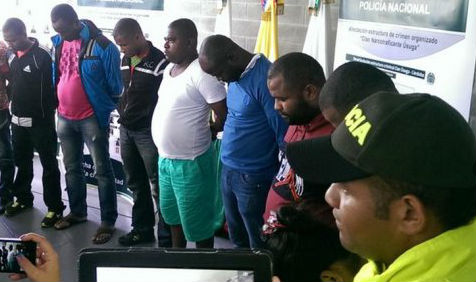Authorities in Colombia have captured the leaders of a network that allegedly trafficked cocaine via plane for criminal organization the Gaitanistas, a reminder of the group’s ability to move large quantities of drugs despite a sustained government offensive against them.
On April 18, Colombian police arrested a pilot known as “Mita,” who allegedly flew cocaine-laden planes on behalf of the Gaitanistas, also known as the Gulf Clan, Urabeños, and Gaitanist Self-Defense Forces of Colombia (Autodefensas Gaitanistas de Colombia – AGC), to Panama and Honduras, reported El Espectador. Police also captured Luis Fernando Galeano alias “Perico,” and Hector Cañaveral Mendoza, alias “Caña,” who were reportedly in charge of obtaining the planes and fabricating licenses.
Another captured accomplice, Carlos Francisco Alvarez Rodriguez, alias “Corbata,” allegedly arranged the hand-off of cocaine shipments to foreign drug trafficking groups in Central America, reported El Pais. The network had reportedly worked for the AGC in this capacity for over six years.
According to Colombia’s National Police, the United States has extradition requests for the detainees on charges of drug trafficking.
Three days after the arrests, on April 21, Colombian authorities captured 72 alleged members of the AGC in a massive operation carried out in several parts of the country.
InSight Crime Analysis
The dismantling of an AGC network that sent aerial drug shipments from Colombia to Central America indicates that this criminal group still has the resources to conduct large-scale transnational drug trafficking operations. The AGC have lost a number of high-level operatives in recent years, but the group’s leader, Dario Antonio Usuga, alias “Otoniel,” has managed to avoid capture, making him one of Colombia’s last major drug capos not dead or behind bars.
SEE ALSO: Urabeños News and Profiles
The security force offensive launched in February against Otoniel and the AGC in Colombia’s northwest Uraba region reflects the importance Colombian authorities have placed on dismantling this criminal organization. According to police figures, with nearly 3,000 operatives the AGC have almost ten times more members than the next largest neo-paramilitary organization, or BACRIM (from the Spanish for “bandas criminales”), in Colombia. The weakened state of Colombia’s other criminal groups means the AGC are arguably the last BACRIM that pose a serious challenge to the country’s security.
The captures also suggest Colombian authorities may be underestimating the scale of aerial drug trafficking operations in the country. According to Colombia’s Air Force, the number of drug flights detected by authorities has dropped by 99 percent over the past decade, from 700 in 2004 to just six between January and November 2014.

